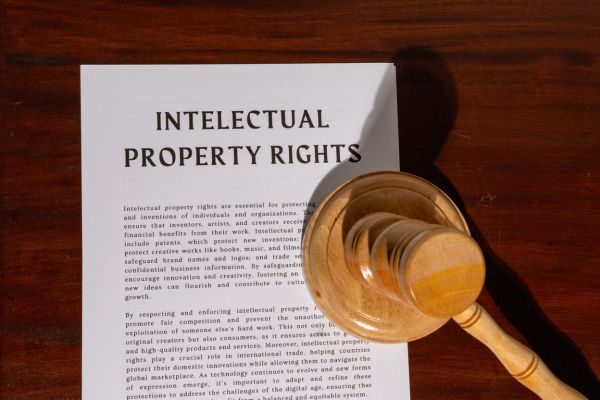If you’ve ever come up with a business idea and worried someone might copy it, you’re already thinking about what is intellectual property in business. And honestly, in today’s world where ideas travel at the speed of Wi-Fi, protecting your creations is pretty much a survival skill. The thing is, many business owners hear the term “intellectual property” and assume it’s just boring legal stuff for lawyers to handle. But you know what? It’s actually one of the most powerful tools you can use to safeguard your brand, your profits, and your competitive edge.
Let’s break it all down in a way that feels normal, less stiff, and more like you’re chatting with a friend who just happens to know a lot about this stuff.
Understanding What Intellectual Property Really Means
So, what is intellectual property in business at its core? It’s basically the legal rights you get for creations that come from your mind. Think ideas, branding elements, logos, inventions, product designs, business names, software you coded at midnight, or even the catchy slogan you scribbled on a napkin. Anything that’s uniquely yours and represents your work or brand identity could fall under the umbrella of intellectual property.
It’s called “property’’ because, yup, the law lets you own it the same way you’d own a car or a piece of furniture. Even though it’s not physical, the rights attached to it are very real — and very valuable.
Why Intellectual Property Matters More Than People Think
Let’s be real for a second. We live in a world where competitors can pop up overnight. Someone on the other side of the world could take your logo, replicate your product, or even copy your entire website layout if you don’t protect it. Understanding what is intellectual property in business helps you avoid those nightmare situations long before they show up.
Intellectual property builds trust too. When customers see your trademark or unique branding, they know they’re dealing with the real thing — not some cheap knockoff. And when investors get involved, IP protection is one of the first things they look for. It shows your business has something original, something worth backing.
The Main Types of Intellectual Property in Business
When digging deeper into what is intellectual property in business, it helps to understand the different categories. Each type protects a different kind of creation or idea, and knowing the difference will save you a ton of confusion later.
Trademarks are those symbols, names, words, or designs that help people recognize your brand instantly. Think of the swoosh on Nike shoes or the golden arches of McDonald’s. Your business name, brand logo, slogan, or even a unique jingle can be protected by a trademark. Without it, anyone could create a look-alike brand just to piggyback on your success.
Then we have copyrights, which protect original creative works. If you write blog posts, record videos, shoot photos, compose music, or design graphics, copyright shields your content from being used or stolen without your permission. This one is especially important for content creators, marketers, and online business owners.
Patents are for inventions — the unique products or processes you create that didn’t exist before. If you’ve invented a new gadget, developed a special formula, or built a new kind of tool, a patent prevents others from making, selling, or profiting from your invention. This is one area where the law gets super technical, so most people work with a patent lawyer.
Trade secrets are, well, secrets. These are the formulas, strategies, techniques, or business processes that give your brand an edge. Think Coca-Cola’s famous recipe or Google’s search algorithm. If revealing something would weaken your business advantage, it’s probably a trade secret. These are protected not through registration but through internal policies, contracts, and confidentiality agreements.
How Intellectual Property Protects Your Business From Threats
Once you truly understand what is intellectual property in business, you’ll see how much protection it gives you behind the scenes. It creates legal barriers that stop people from copying your work, using your branding, or trying to profit from your original ideas. It also gives you the right to take legal action if someone steps over the line.
Let’s say someone uses your business name online. With a registered trademark, you can force them to stop. Or maybe someone lifts your blog content and posts it as their own. Copyright laws let you issue a takedown request and reclaim your work. These things happen more often than you’d think, especially in the online space, so having IP protection is like having insurance for the stuff you create.
The Financial Value Behind Intellectual Property
This part surprises a lot of new entrepreneurs. Intellectual property doesn’t just protect your ideas — it can actually boost your business’s value. Investors, buyers, and partners look closely at IP assets because they represent ownership of something original and profitable. Sometimes the intellectual property of a business is worth more than its physical assets.
Think about software companies, franchises, or fashion brands. What people are paying for isn’t just products. They’re paying for the brand, the design, the technology, or the concept behind it. That’s the power of IP. It turns your idea into an economic asset that can grow, be licensed, or even be sold on its own.
Practical Examples of Intellectual Property in Everyday Business
If you’re still wondering what is intellectual property in business, it may help to see how it shows up in real life. Imagine you run a bakery. Your bakery name, logo, and tagline can be trademarked. Your website photos and menu designs are covered by copyright. If you invented a new baking technique or created a popular secret recipe, that could be a trade secret. And if you developed a new pastry mold or tool, that might qualify for a patent.
Even small businesses, freelancers, and startups rely on intellectual property more than they realize. From social media branding to product designs to client strategies, so much of what you create carries value — and risk — if left unprotected.
How to Start Protecting Your Intellectual Property
Now that the meaning of what is intellectual property in business is clearer, the next step is making sure you protect your creations. A lot of business owners wait too long and only think about IP after someone copies their work, but by then the damage is already done.
Start by identifying the things in your business that are original or unique. Your name, logo, branding, product designs, content — all of it. Then look into whether a trademark, copyright, or patent applies. You don’t have to do everything at once. And you don’t need to be a legal expert. But a little awareness goes a long way.
Keeping documentation is also important. Save drafts, designs, concepts, emails, anything that shows you created something first. For trade secrets, make confidentiality agreements a normal part of your business operations. It’s easier to prevent a problem than to fix one later.
Why Ignoring Intellectual Property Can Cost You Big
Let’s be blunt: ignoring IP is like leaving your car unlocked in a crowded parking lot. Maybe nothing will happen for a while, but eventually someone will take advantage. And when they do, it could cost you money, your reputation, or even your entire business identity.
Competitors could use your name. Copycats might steal your content. Your original ideas could be repackaged and sold by someone else without giving you credit. And if you don’t have proper IP protection, you might not have the legal standing to fight back. Understanding what is intellectual property in business isn’t just helpful — it protects the very core of your brand.
Final Thoughts: Protect What Makes Your Business Unique
Now that you understand what is intellectual property in business, you can probably see how crucial it is for long-term success. Every business has something unique, something that sets it apart, and intellectual property is the legal shield that keeps that uniqueness safe. Whether you’re running a startup, a small online shop, or a rapidly growing brand, IP isn’t just for “big companies.” It’s for anyone who creates, builds, or innovates.
The bottom line? Your ideas matter. Your creativity matters. And your brand identity really matters. Protecting your intellectual property isn’t about being paranoid — it’s about being smart, prepared, and confident in the value you’re bringing to the world.
If you take the time to secure your intellectual property now, you’ll thank yourself later. Trust me on that.



